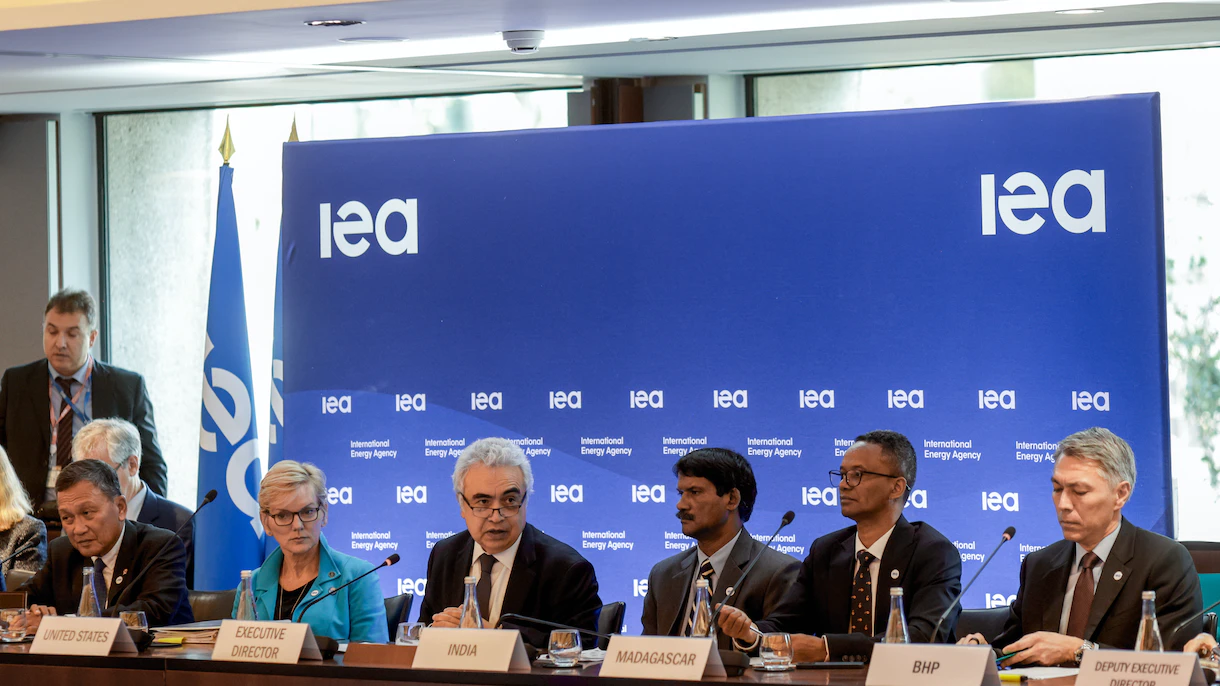Description

Copyright infringement not intended
Picture Courtesy: www.iea.org
Context: The first International Energy Agency (IEA) Critical Minerals and Clean Energy Summit, held in Paris on September 28, 2023, brought together key stakeholders including ministers, industry leaders, investors, international organizations, and civil societies from 50 countries.
Details
- The first International Energy Agency (IEA) Critical Minerals and Clean Energy Summit was held on 28 September 2023 in Paris, France. The summit brought together ministers, industry leaders, investors and civil society representatives from nearly 50 countries to discuss the role of critical minerals in clean energy transitions and how to ensure their secure, sustainable and responsible supply.
- Critical minerals are raw materials that are essential for the production of clean energy technologies such as solar panels, wind turbines, batteries and electric vehicles. They include metals such as lithium, cobalt, nickel, copper, rare earth and platinum group metals. The demand for these minerals is expected to increase significantly in the coming years as countries pursue their net-zero emissions goals and accelerate their energy transitions.
- However, the supply of critical minerals faces various challenges such as geopolitical risks, environmental and social impacts, market volatility, lack of transparency and innovation gaps. These challenges could pose threats to the affordability, reliability and sustainability of clean energy technologies and hamper global efforts to combat climate change.
- The Summit aimed to build on the findings and recommendations of the report and foster a broader consensus among the participants on effective courses of action to address the critical mineral challenges.
Summit resulted in six key actions that were endorsed by the participants:
- Advancing Diversified Mineral Supplies: Participants emphasized the need to accelerate progress towards diversified and sustainable supplies of critical minerals. This action involved exploring investments, innovation, recycling, sustainability standards, and safety nets to secure these supplies.
- Maximizing Technology and Recycling: Delegates recognized the importance of recycling and leveraging technology to their fullest extent. Utilizing innovative methods in extraction, processing, product design, and end-of-life processes was deemed essential to enhance resource efficiency and reduce supply constraints.
- Fostering Market Transparency: Lack of transparency in pricing across mineral markets hampers new investments. To address this issue, the IEA committed to strengthening market monitoring capabilities, including supply and demand projections, in line with the G7 Five-Point Plan for Critical Minerals Security.
- Improving Accessibility of Trustworthy Information: Providing accessible and reliable information about critical minerals was highlighted. This action aims to inform stakeholders, policymakers, and the public about the importance and availability of these minerals for the clean energy transition.
- Establishing Incentives for Sustainable and Responsible Production: Recognizing the significance of rewarding environmental, social, and governance efforts, the leaders agreed to incentivize sustainable and responsible production of critical minerals. Approvals of new facilities would be expedited without compromising legal and regulatory protections.
- Fostering International Cooperation: Participants acknowledged that no single nation or company could handle the growing demand for critical minerals alone. International cooperation was emphasized, encouraging collaborative efforts among nations, industries, and organizations to address the challenges associated with critical mineral supplies.

Conclusion
- The IEA Critical Minerals and Clean Energy Summit was a timely initiative that highlighted the importance of critical minerals for clean energy transitions and provided a platform for international cooperation on this vital issue. India stands to benefit from participating in this summit and implementing the six key actions that were agreed upon. By doing so, India can ensure its energy security, support its economic growth and contribute to the global fight against climate change
Must Read:
Critical Minerals: https://www.iasgyan.in/daily-current-affairs/critical-minerals
|
PRACTICE QUESTION
Q. What were the key actions agreed upon at the first IEA Critical Minerals and Clean Energy Summit, held in Paris in September 2023, to address the challenges and opportunities related to the rising demand for minerals required for clean energy technologies, and how do they aim to ensure sustainable, ethical supply chains of these vital minerals?
|















